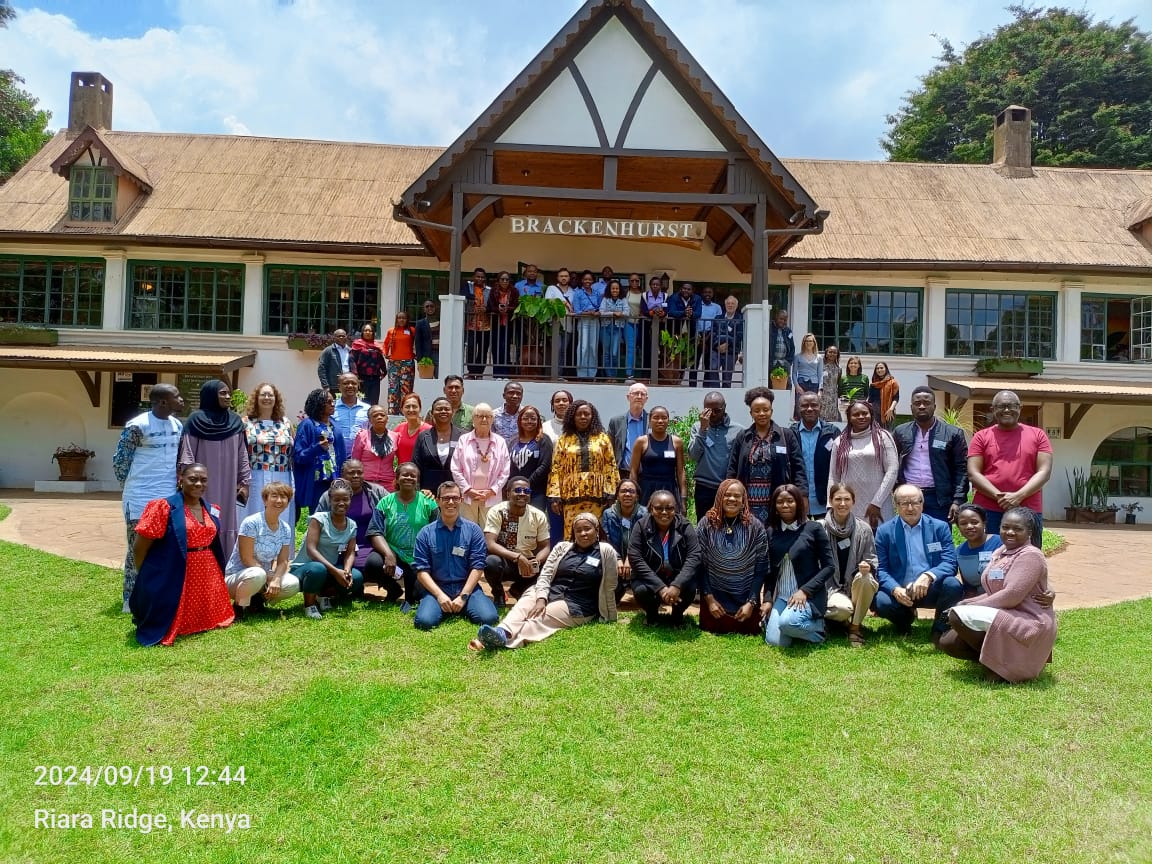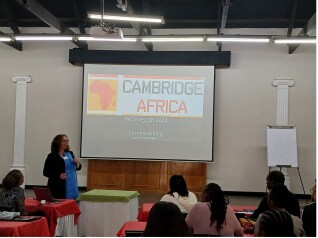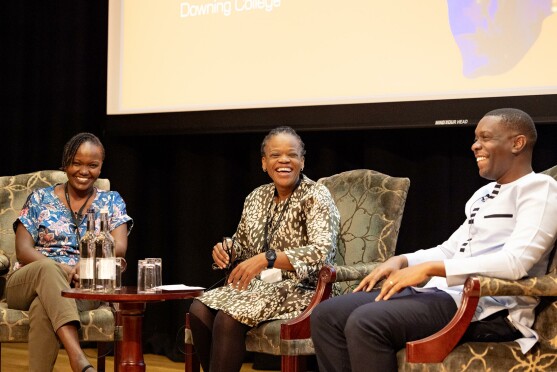Breathing Easier

Cambridge-Africa has recently been focusing on lung health as a strategic priority This has been a neglected area of very significant morbidity and mortality, especially in low income countries. A Lancet paper published in May 2024 analysing the Global Burden of Disease 2021 data highlighted that air pollution was the leading contributor to disease globally. The Global Burden of Disease 2021 data is informed by a network of more than 11,000 collaborators in more than 160 countries and is the most up to date data analysing disease globally. Sub-Saharan Africa and South Asia experience particularly high levels of air pollution. The map below indicates areas of highest air pollution in red and lowest in dark blue.[1]
Air Pollution 2021 from GBD data

Not only do people in sub-Saharan Africa experience high exposure to air pollution but they often lack the medicines and health care to deal with the problems that air pollution exacerbates. For example, access to inhalers to control asthma is inadequate as they are either unaffordable or unavailable (or both) for much of the population. So how is Cambridge-Africa supporting researchers in Africa to highlight this largely under recognised issue?
Over the past three years we have been supporting the PATS-MECOR programme. This important Programme, led by the Pan African Thoracic Society (PATS), supports research capacity development in Africa on lung health. The PATS-MECOR (Methods in Epidemiologic, Clinical and Operations Research) course provides intensive training at three levels for clinicians and other health professionals, who are then well placed to undertake impactful research on lung health. The course held annually in Africa, selects 50 students who provide information on their research goals. The first level is aimed at aspiring researchers and enables them to develop research skills and to refine their research proposals into effective, workable research. The second level provides more advanced research skills training to those who have undertaken research following the level one course. The third level is aimed at experienced researchers who have completed the previous levels and are focused on becoming respiratory research leaders. Mentorship is provided by world class lung researchers, many of whom are the faculty for the three courses.
The success of the programme is exemplified by PATS-MECOR now being led by leading African respiratory researchers who were PATS-MECOR students in the initial years of the programme. Associate Professor Uju Ozoh, University of Lagos, Nigeria, 2023 winner of the World Lung Health Award and Professor Refiloe Masekela (pictured below), a paediatric pulmonologist, head of the Department of Paediatrics and Child Health at the University of KwaZulu Natal, South Africa, and the first LMIC (Low and Middle Income Country) based researcher to be awarded the prestigious NIHR Global Research Professorship lead the programme.
Corinna Alberg, Cambridge-Africa programme Manager, addressing PATS-MECOR 2024 delegates on opportunities offered by the Cambridge-Africa Programme and other programmes in Cambridge.
 The Cambridge-Africa ALBORADA Research Fund provided funding to PATS-MECOR as did our partners the Aldama Foundation who have been very generous in their support of PATS-MECOR.
The Cambridge-Africa ALBORADA Research Fund provided funding to PATS-MECOR as did our partners the Aldama Foundation who have been very generous in their support of PATS-MECOR.
Three other lung health related research projects have been supported with awards from the Cambridge-Africa ALBORADA Research Fund. The first between Dr Wanjiku Kagima (pictured below, University of Nairobi and PATS-MECOR faculty member) and Dr Jenny Dickens (University of Cambridge/Royal Papworth Hospital) focused on developing a better understanding of the burden of interstitial lung disease in Kenya and improving knowledge and care for these disorders.
A second project led by Prof Richard van Zyl-Smith (PATS-MECOR Faculty member and University of Cape Town) and Dr Sebastian Kurten (University of Cambridge), is researching the growth of vaping in South Africa among adolescents. The research will inform an intervention to reduce vaping among high school students. A third research project led by Dr Osman Abdullahi (Pwani University, Kenya) and Dr Nyarie Sithole (University of Cambridge), is taking a deep dive into the underlying causes of high mortality among those diagnosed clinically with TB in Kilifi County, Kenya. The rationale for this study is that many people are treated for TB in Africa based on a clinical diagnosis but there may be a separate disease, or a combination of TB and other diseases, that is not investigated due to the clinical TB diagnosis, resulting in the high mortality. This research may inform TB care in Kilifi and elsewhere in Africa and help resolve high rates of treatment failure. We hope to share blogs on these projects on the Cambridge-Africa website in the coming months.
Dr Wanjiku Kagima (Cambridge-Africa ALBORADA Research fund awardee working on ILD and PATS-MECOR faculty member), Prof Refiloe Masekela (Keynote speaker and Director of PATS-MECOR) and Dr Gabriel Okello (University of Cambridge lung health researcher) at the Cambridge-Africa day, 2024.
 The Cambridge-Africa Programme, with additional funds from the Derrill Allat Foundation, has supported further lung health related research. The impact of the electrification of boda bodas (very commonly used and highly polluting motorbike taxis found in many African cities) in reducing air pollution Kampala, Uganda, a city with one of the worst levels of air pollution globally is being analysed. Dr Gabriel Okello (pictured left), Prince of Wales Global Sustainability Fellow at the Cambridge Institute for Sustainability Leadership, and Dr Lambed Tatah of the MRC Epidemiology Unit, University of Cambridge have been undertaking this research. We will publish the report on their findings soon on the Cambridge-Africa website.
The Cambridge-Africa Programme, with additional funds from the Derrill Allat Foundation, has supported further lung health related research. The impact of the electrification of boda bodas (very commonly used and highly polluting motorbike taxis found in many African cities) in reducing air pollution Kampala, Uganda, a city with one of the worst levels of air pollution globally is being analysed. Dr Gabriel Okello (pictured left), Prince of Wales Global Sustainability Fellow at the Cambridge Institute for Sustainability Leadership, and Dr Lambed Tatah of the MRC Epidemiology Unit, University of Cambridge have been undertaking this research. We will publish the report on their findings soon on the Cambridge-Africa website.
[1] Global burden and strength of evidence for 88 risk factors in 204 countries and 811 subnational locations, 1990–2021: a systematic analysis for the Global Burden of Disease Study 2021 Brauer, Michael et al. The Lancet, Volume 403, Issue 10440, 2162 – 2203
Blog by Corinna Alberg, Cambridge-Africa Programme Manager

